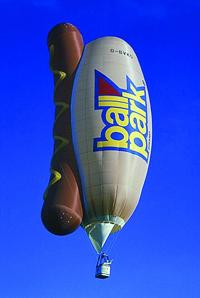Ball Park Franks, the top-selling hot dog in America, have Jewish Detroit roots.
March 20 was the first day of Spring. Flowers and trees will soon start to bloom (although we could still have snow — it is Michigan) and the Detroit Tigers are looking toward to their opening day at Comerica Park in April.

We are also nearing cookout and picnic season, which means grilled hamburgers, chicken and, most of all, hot dogs! Indeed, the nearly 3,000 pages in the William Davidson Digital Archive of Jewish Detroit History that mention hot dogs are a testimony for the importance of this essential food.
Of course, one cannot write about hot dogs in Detroit without mentioning the famous Coney Island Hot Dog, perhaps the city’s most iconic food. Just say, “I’d like a coney,” and everyone will know that you want a hot dog with chili, onions and mustard — no ketchup, please! Coneys were mentioned in nearly 40 columns by our late, great JN writer, Danny Raskin.

However, the king of hot dogs in America are the famous all-beef Ball Park Franks. Last year, $222 million worth of Ball Park Franks were sold in stores, and an estimated 91 million Americans ate a Ball Park Frank (or two or three). The also famous Oscar Mayer wiener was a distant second with sales of $137 million.
I found interesting information about Ball Park Franks in the Archive. First, did you know that they were the invention of a Jewish-owned Detroit company?
Ball Park Franks were created by Detroit’s Hygrade Food Products Corp., which was founded by Jewish Russian immigrant Samuel Slotkin. In 1900, Slotkin, and co-founder, Isidor Chorney, created the Hygrade Provision Company in New York in 1914. He then established the Hygrade Food Products Corp in Detroit (see obits in Nov. 5, 1965, Dec. 19, 1969 JN).
Since then, several generations of Slotkins have worked at Hygrade. Hugo Slotkin was elected president of Hygrade in 1949 and moved the company HQ to Detroit. In 1956, he was elected chair and CEO, and held these positions until the company was sold in 1969. Mitchell “Mickey” Slotkin, the third generation, was involved in creation of Ball Park Franks (Aug. 8, 2019, JN).
BTW — current U.S. senator from Michigan Elissa Slotkin is related to the Slotkin family behind Hygrade Food Products.

The story of the Ball Park Frank is a bona fide piece of Jewish Detroit history. It was created in 1957 as the official hot dog for Tiger Stadium, home of the Detroit Tigers baseball team. It was a home run with Tigers fans.
Ball Park Franks were then transformed into a leading grocery-store hot dog through an advertising campaign created by Detroit’s W.B. Doner agency in the 1960s. The tagline for Ball Park Franks, “They plump when you cook ’em,” became about as famous as the Oscar Mayer Wiener song.
I discovered other related stories. Hygrade Deli (which offers a great Reuben) first opened in 1952 at Detroit’s old Western Market. It was named for that Market’s anchor business, Hygrade Food Products (April 21, 2016).
My favorite story is that of Leon Maloff, a longtime hot dog seller at Tiger Stadium for over 40 years. Maloff also appeared in radio and print ads for Ball Park Franks in the 1960s (April 7, 1989).
I guess Ball Park Franks are as Jewish American as apple pie.
Want to learn more? Go to the DJN archives, available for free at










(0) comments
Welcome to the discussion.
Log In
Keep it Clean. Please avoid obscene, vulgar, lewd, racist or sexually-oriented language.
PLEASE TURN OFF YOUR CAPS LOCK.
Don't Threaten. Threats of harming another person will not be tolerated.
Be Truthful. Don't knowingly lie about anyone or anything.
Be Nice. No racism, sexism or any sort of -ism that is degrading to another person.
Be Proactive. Use the 'Report' link on each comment to let us know of abusive posts.
Share with Us. We'd love to hear eyewitness accounts, the history behind an article.